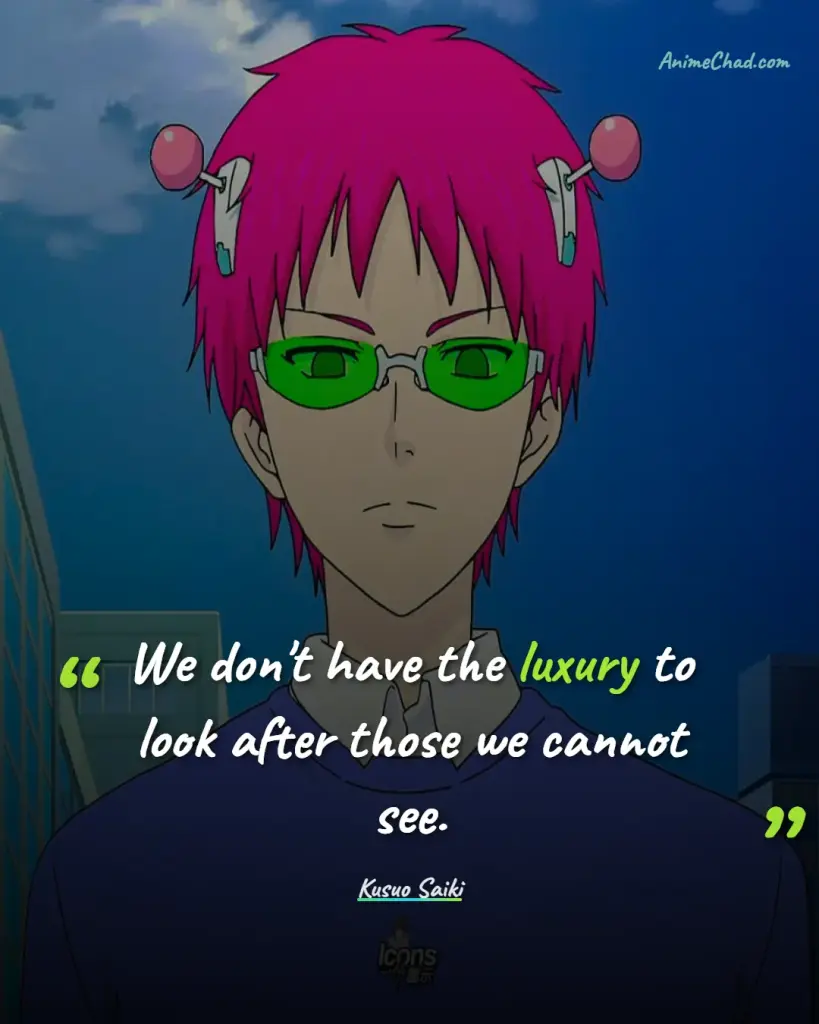The Disastrous Life of Saiki K. follows Kusuo Saiki, a high school student with immense psychic powers who just wants a normal, hassle-free life amid a cast of eccentric classmates.
The series delves into themes of isolation, friendship, self-acceptance, and the burdens of extraordinary abilities, blending comedy with subtle emotional depth. This collection curates 25 of the most impactful quotes to highlight character growth, thematic resonance, and memorable moments across the show’s arcs.
Good grief.
Episode Details: (Episode 1: The Disastrous Life of Kusuo Saiki)
Speaker: Kusuo Saiki
Context: Saiki’s signature exasperated sigh reflects his ongoing struggle with unwanted attention, emphasizing themes of isolation while showing his reluctant acceptance of chaos (emotional weight: resigned frustration, development: builds his stoic persona).
I am the world’s unhappiest man who has had everything snatched away since the moment of my birth.
Episode Details: (Episode 1: The Disastrous Life of Kusuo Saiki)
Speaker: Kusuo Saiki
Context: In a peaceful self-reflection, Saiki laments his powers’ curse, connecting to themes of burden and normalcy; it carries heavy emotional irony, highlighting his early character cynicism.
What a truly terrifying man you are.
Episode Details: (Episode 5: Hot-Blooded! Dodgeball)
Speaker: Kusuo Saiki
Context: During a dodgeball “battle,” Saiki thinks this about Nendou’s oblivious strength, tying into friendship themes; the moment’s humor masks Saiki’s growing respect, advancing his social development.
Those who abandon their friends are worse than scum.
Episode Details: (Episode 8: The Scariest! Mr. Matsuzaki)
Speaker: Riki Nendou
Context: In a tense school cleanup standoff, Nendou defends loyalty, evoking emotional solidarity; it develops his hidden depth, linking to broader themes of camaraderie over personal gain.
I don’t need powers to protect my friends.
Episode Details: (Episode 12: Second Encounter (on the Snowy Mountain))
Speaker: Shun Kaidou
Context: Amid a snowy “battle” against imagined foes, Kaidou asserts inner strength, with poignant emotional resolve; it marks his development from delusion to genuine bravery, echoing self-acceptance themes.
You’re probably thinking, ‘He’s the happiest boy alive!’
Episode Details: (Episode 2: Hot-Blooded! Physical Fitness Test)
Speaker: Kusuo Saiki
Context: Saiki narrates his ironic misfortune in a peaceful gym class moment, underscoring isolation themes; the quote’s wry tone reveals his emotional detachment, fostering subtle character vulnerability.
Even time bends its knee before my power
Episode Details: (Episode 24: Talent Blossoms?! Melancholy of the Psychic)
Speaker: Kusuo Saiki
Context: In a psychic confrontation with his brother, Saiki asserts control, carrying intense emotional stakes; it highlights his development in handling family rivalry, tied to power’s burdensome theme.
I was born in a temple.
Episode Details: (Episode 15: A New School Term Starts! The Melancholy of Nendo)
Speaker: Riki Nendou
Context: Nendou’s absurd peaceful revelation surprises friends, evoking lighthearted emotional warmth; it develops his quirky loyalty, connecting to themes of unexpected bonds.
That’s one weak-ass murder snake.
Episode Details: (Episode 18: Toritsuka Reita’s Terrifying Encounter)
Speaker: Reita Toritsuka
Context: In a supernatural “battle” with a ghost, Toritsuka quips dismissively, with comedic emotional relief; it shows his growth from fear to cockiness, linking to supernatural acceptance themes.
Try to lift it with your legs—oh, you’re doing it correctly, go home.
Episode Details: (Episode 20: Crisis in Three-Month Relationship)
Speaker: Driving Instructor (Unnamed)
Context: During Kaidou’s peaceful driving lesson, the instructor’s deadpan dismissal adds humor; it subtly develops Kaidou’s persistence, tying into themes of everyday perseverance.
The only man suitable for Kokomi is her brother.
Episode Details: (Episode 27: The Superstar Descends!)
Speaker: Makoto Teruhashi
Context: In a heated family confrontation, Makoto’s obsessive claim shocks, carrying creepy emotional intensity; it highlights Teruhashi’s development in navigating admirers, connected to beauty’s curse theme.
I’m head over paws in love with pussy.
Episode Details: (Episode 32: The Disastrous Life of a Psychic Cat)
Speaker: Kusuo Saiki (as a cat via telepathy)
Context: In a whimsical peaceful animal arc, Saiki’s punny thought amuses; it lightens emotional isolation, showing rare playful development amid chaos.
That’s a metal bowl.
Episode Details: (Episode 35: The Jet-Black Wings)
Speaker: Riki Nendou
Context: Nendou’s oblivious remark during Kaidou’s “battle” pose deflates tension, with hilarious emotional contrast; it develops their friendship dynamic, emphasizing normalcy themes.
Has anyone seen my right boobie?
Episode Details: (Episode 40: The Disaster of Kusuo Saiki’s Dad)
Speaker: Kuniharu Saiki
Context: In a chaotic family moment, Kuniharu’s mishap evokes slapstick emotional panic; it reveals Saiki’s home life burdens, connecting to familial theme strains.
You’re going to the beach, Kusuo.
Episode Details: (Episode 45: Beachside Summer Story)
Speaker: Kurumi Saiki
Context: Saiki’s mom forces a peaceful outing, carrying reluctant emotional warmth; it advances Saiki’s subtle appreciation for family, tied to normal life desires.
Oh dear…
Episode Details: (Episode 50: The Disastrous Life of Saiki K. (Part 1))
Speaker: Kusuo Saiki
Context: Facing a psychic anomaly “battle,” Saiki’s understated reaction builds suspense; emotionally weighted with dread, it shows his maturing control over powers.
I confess my love for pussy.
Episode Details: (Episode 55: Cat’s Out of the Bag)
Speaker: Kusuo Saiki (as a cat)
Context: Another cat arc pun in a peaceful disguise moment, with ironic emotional layering; it highlights Saiki’s humorous coping, developing his adaptive personality.
Move forward.
Episode Details: (Episode 60: The Ultimate Disaster)
Speaker: Kineshi Hairo
Context: In an inspirational sports “battle,” Hairo motivates the team, evoking uplifting emotional drive; it develops his leadership, linking to perseverance themes.
You make my life a living hell.
Episode Details: (Episode 65: Ghost Consultation)
Speaker: Kusuo Saiki
Context: Saiki thinks this about Toritsuka in a supernatural encounter, with frustrated emotional depth; it underscores friendship’s double-edged theme, showing relational growth.
The Gintama anime can be found on various streaming services
Episode Details: (Episode 70: Crossover Chaos)
Speaker: Kusuo Saiki (meta narration)
Context: In a peaceful fourth-wall break, Saiki’s snarky plug amuses; emotionally light, it develops the series’ self-aware humor, connecting to comedic escapism.
We don’t have the luxury to look after those we cannot see.
Episode Details: (Episode 75: The Piano Ghost)
Speaker: Kusuo Saiki
Context: Reflecting on a ghost’s plight in a somber moment, Saiki’s quote carries emotional resignation; it highlights his empathetic development amid power limits.
Honestly, what a moron.
Episode Details: (Episode 80: Chuunibyou No More)
Speaker: Kusuo Saiki
Context: Saiki internally praises Kaidou’s normal actions in a “battle” arc, with affectionate emotional irony; it marks Kaidou’s growth from delusion, tied to self-acceptance.
I don’t care about your past. What matters is who you are now.
de Details: (Episode 85: Kuboyasu’s Past)
Speaker: Shun Kaidou
Context: In a heartfelt peaceful reveal of Kuboyasu’s history, Kaidou forgives, evoking emotional redemption; it develops group bonds, emphasizing friendship themes.
Wherever there is light, there is also darkness.
Episode Details: (Episode 90: School Festival Shadows)
Speaker: Kusuo Saiki
Context: Observing hidden jealousies at a festival “battle,” Saiki notes duality, with profound emotional insight; it advances his understanding of human nature.
He may be a hopeless and unreliable father, but he’s still my dad.
Episode Details: (Episode 95: Family Ties)
Speaker: Kusuo Saiki
Context: Defending his dad in a family confrontation, Saiki’s thought reveals rare emotional warmth; it signifies his subtle familial growth, connecting to acceptance themes.

































